At a press conference in Belize City on Thursday, November 17th, Oceana Belize announced the commencement of a countrywide signature collection drive to trigger a national referendum regarding oil exploration in Belizean waters. Vice-President Janelle Chanona said the decision was made following a conversation with Prime Minister Honourable Dr. John Briceño in September. She claims it confirmed the current administration’s intention to proceed with seismic testing in Belizean waters without prior approval from the public.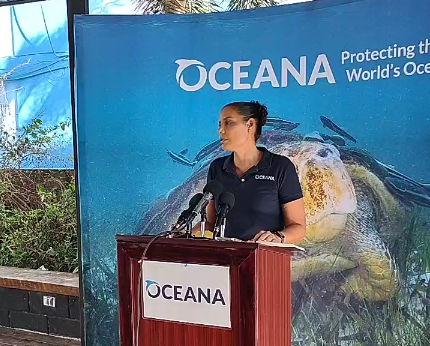
A moratorium against off-shore oil exploration in Belize was vetted by the then government in 2017 under the United Democratic Party. This moratorium, which became the Petroleum Operations (Maritime Zone Moratorium) Act 2017, was triggered after the government reportedly agreed to begin off-shore oil exploration in 2016. In October that year, vessels were spotted in Belizean waters, reportedly getting ready to conduct seismic testing near the Belize Barrier Reef System, a World Heritage Site. Following the strong opposition and outcry from the public, particularly in San Pedro, Ambergris Caye, the government suspended those activities, and the research ships were escorted out of Belizean waters. This led to public consultations and petitions, resulting in a moratorium against off-shore oil exploration that was passed in the House of Representatives and the Senate.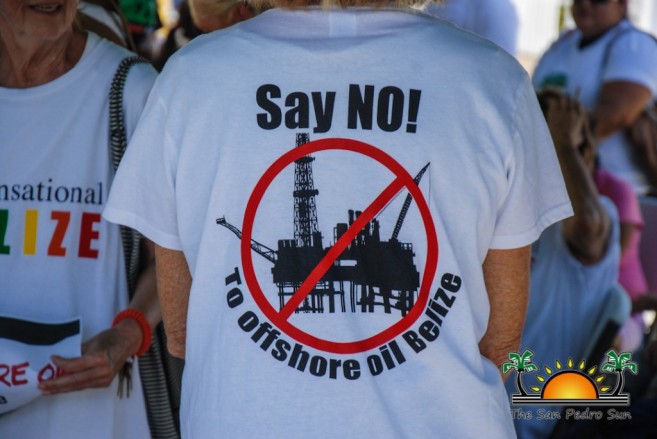
If the current government under the People’s United Party wants to consider such activities, Oceana believes that the public must be consulted. “Given the years of support against off-shore oil and the level of public outcry in 2016 in response to seismic ships that were secretly cleared to begin work, we feel strongly that this is an issue that Belizeans want to be consulted on before any shift in the current policy position on off-shore oil,” said Chanona. She noted that the only reason to collect seismic data is to proceed with oil production.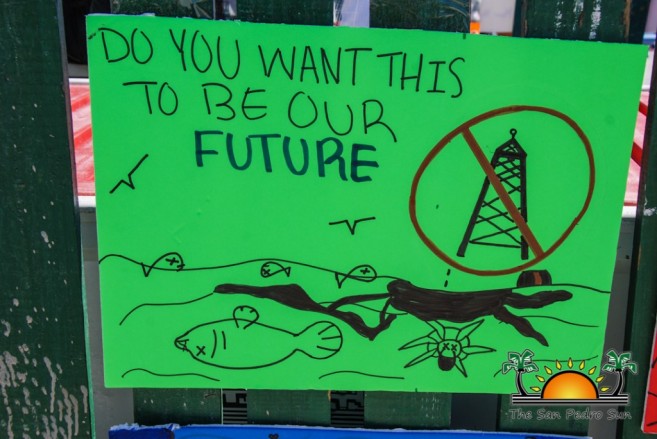
According to her, a national referendum on the topic is the most decisive and transparent way for Belizeans to participate in decisions that would impact their lives. Chanona does not share the idea that off-shore oil exploration benefits Belize. She maintains that the people must be consulted and allowed to answer the question put to Belizeans in their signature collection drive asking, ‘Do you support a legislative ban by way of an amendment to the Belize Constitution, Chapter 4 of the Laws of Belize, which will prohibit off-shore petroleum and natural gas exploration (including but not limited to seismic testing, seismic surveys, multibeam surveys), development, drilling, extraction, production, storage and disposal within the internal waters, territorial sea and the exclusive economic zone of Belize (“petroleum operations”), unless a referendum is held in accordance with the Referendum Act, Chapter 10 of the Laws of Belize which approves such petroleum operations?’
Oceana said that signature collectors would be working countrywide. For information on how to participate in this campaign, contact Oceana via their social media platforms or WhatsApp at 610-0952.
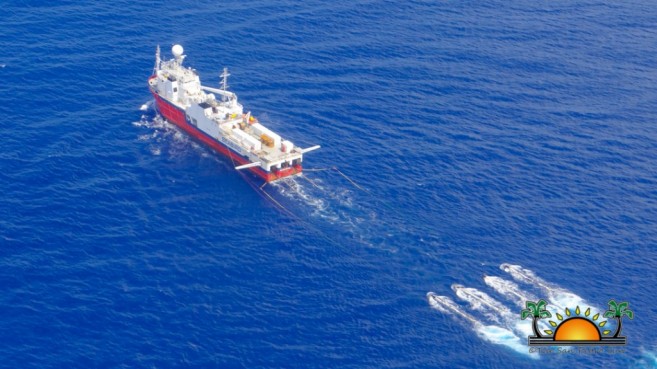
Government responds to Oceana claims
In a press released issued at 5:55PM on the same day, the GOB stated:
“Having regard to the press conference held by Oceana today, November 17, 2022, the Government of Belize hereby clarifies that it has not entered into any agreements for seismic studies nor for oil exploration in offshore areas. The Government of Belize has made unprecedented progress in positioning its natural capital in its overall vision for the economic recovery and growth of our country. Consistent with Plan Belize, and its mandate to ensure the responsible use of its natural capital to realize its economic, social and environmental goals, the government will continue to approach its natural capital resources in a responsible and wise manner.
In the meeting held on September 9, 2022, the Prime Minister, among other matters, did discuss the issue of seismic surveys and the existing moratorium with Oceana. In pursuance of his commitment to environmental and social principles, the Prime Minister reiterated the need to understand the extent of Belize’s offshore non-renewable economic resources in order to have an informed strategy on their potential for leveraging, given the national direction towards decarbonization and nature-based economy. Furthermore, the government’s commitment to allow the determination of such an important policy to be people-centered was restated by the Prime Minister.
The statements by Oceana at the press conference today are regrettable especially given its accessibility to this administration’s offices at the highest level for open and transparent discourse to have a clear and unified approach to this issue and all matters of mutual and national interest.” -end-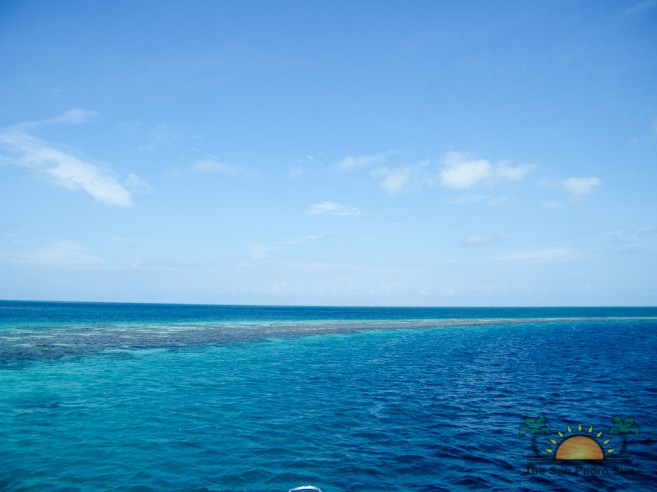
Government commitment to marine conservation
In November 2021 Prime Minister Briceño signed a Memorandum of Understanding (MOU) with the World Wildlife Fund and The Nature Conservancy to create a Project Finance initiative for Permanence by 2025. This project, considered the first of its kind, is part of the Blue Bonds initiative. It is said to benefit Belize with over $300 million in debt relief and to further protect and promote sustainable management of Belize’s coastal-marine ecosystems. The historic MOU was signed in Glasgow, Scotland, UK, during the 26th edition of the Conference of the Parties climate change summit.
As a result, the country committed to being a global ocean conservation leader. Briceño’s government even created a new portfolio, the Ministry of the Blue Economy, headed by the Area Representative of Belize Rural South (Ambergris Caye, Caye Caulker), the Honourable Andre Perez. This ministry launched on October 31st two policy documents for the future proper management of all natural resources. The two policies include the Belize Blue Economy Policy and Strategy and the Belize Maritime Economy Plan. During the event, it was also noted that this ministry is developing a master plan to identify the country’s resources that need preserving and creating regulations and best practices to protect them. Most importantly, the need to determine the type of development(s) that are suitable within the protected jurisdictions was mentioned.
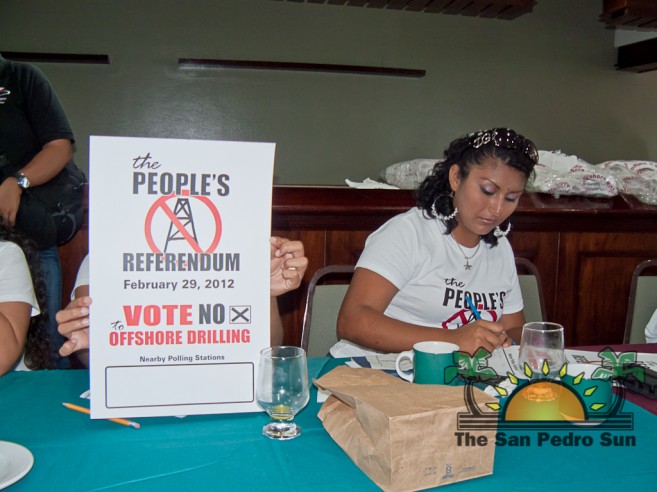
The last time Belizeans were consulted on off-shore oil exploration was in 2012 by the Coalition to Save Our National Heritage, founded by the Belize Environmental Law and Policy and Oceana. The exercise was named “The People’s Referendum.” According to records, approximately 30,000 Belizeans participated in that vote, and 96% voted against off-shore oil activity. The referendum suggested for 2022 aims to strengthen the existing moratorium by implementing a ban on off-shore oil or allowing such activity to take place via a majority vote supporting it.

